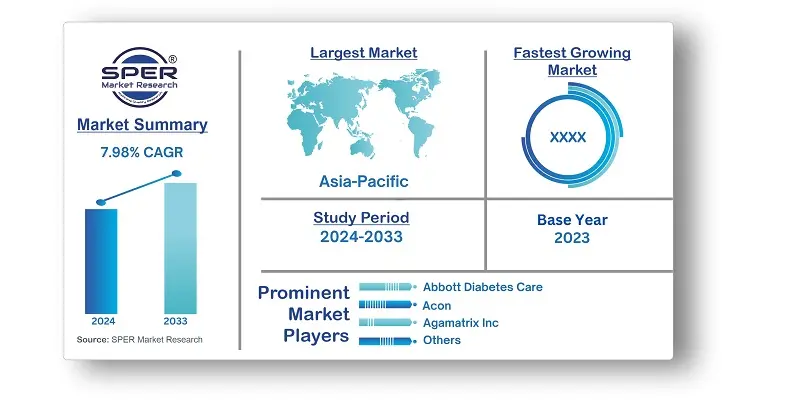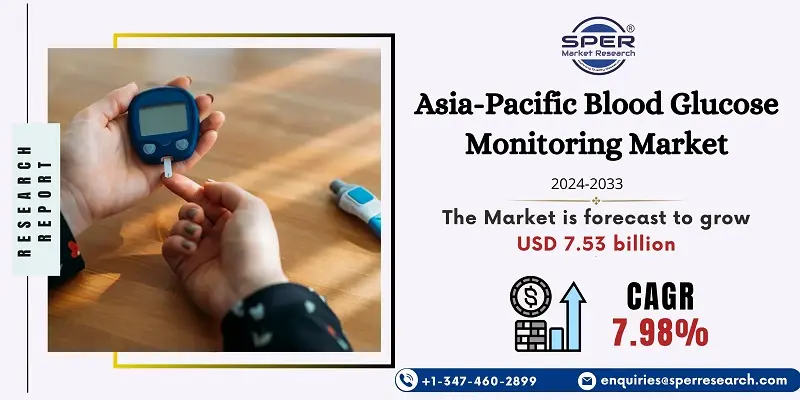
Asia Pacific Blood Glucose Monitoring Market Growth, Size, Trends, Demand and Future Outlook
Asia-Pacific Blood Glucose Monitoring Market Size- By Self Monitoring Blood Glucose Devices, By Continuous Glucose Monitoring Devices, By End User- Regional Outlook, Competitive Strategies and Segment Forecast to 2033
| Published: Feb-2024 | Report ID: MEDE2411 | Pages: 1 - 153 | Formats*: |
| Category : Medical Devices | |||
- FEB 2023: The Dexcom G6 Continuous Glucose Monitoring Device is introduced in Singapore.
- MAR 2022: Quantum Operation Inc., a Tokyo-based healthcare IoT startup, unveiled the world's first non-invasive glucose monitor capable of continuous measuring. It takes blood sugar readings from the wrist with no pricks.


| Report Metric | Details |
| Market size available for years | 2020-2033 |
| Base year considered | 2023 |
| Forecast period | 2024-2033 |
| Segments covered | By Self-monitoring Blood Glucose Devices, By Continuous Glucose Monitoring Devices, By End User |
| Regions covered | China, Japan, Australia, India, Rest of Asia Pacific |
| Companies Covered | Abbott Diabetes Care, Acon, Agamatrix Inc., Arkray, Ascensia Diabetes Care, Bionime Corporation, Dexcom, Johnson and Johnson (Lifescan), Medisana, Medtronic, Roche, Rossmax, Others |
- Individuals with Diabetes
- Healthcare Professionals
- Pharmaceutical Companies
- Medical Device Manufacturers
- Hospitals and Clinics
- Research and Academic Institutions
- Health Insurance Providers
- Government Health Agencies
- Retail Pharmacies
- Diabetes Advocacy Organizations
| By Self-monitoring Blood Glucose Devices: |
|
| By Continuous Glucose Monitoring Devices: |
|
| By End User: |
|
- Asia-Pacific Blood Glucose Monitoring Market Size (FY’2024-FY’2033)
- Overview of Asia-Pacific Blood Glucose Monitoring Market
- Segmentation of Asia-Pacific Blood Glucose Monitoring Market By Self-monitoring Blood Glucose Devices (Glucometer Devices, Test Strips, Lancets)
- Segmentation of Asia-Pacific Blood Glucose Monitoring Market By Continuous Glucose Monitoring Devices (Sensors, Durables)
- Segmentation of Asia-Pacific Blood Glucose Monitoring Market By End User (Hospital/Clinics, Home/Personal)
- Expansion Analysis of Asia-Pacific Blood Glucose Monitoring Market
- Problems and Obstacles in Asia-Pacific Blood Glucose Monitoring Market
- Competitive Landscape in the Asia-Pacific Blood Glucose Monitoring Market
- Impact of COVID-19 and Demonetization on Asia-Pacific Blood Glucose Monitoring Market
- Details on Current Investment in Asia-Pacific Blood Glucose Monitoring Market
- Competitive Analysis of Asia-Pacific Blood Glucose Monitoring Market
- Prominent Players in the Asia-Pacific Blood Glucose Monitoring Market
- SWOT Analysis of Asia-Pacific Blood Glucose Monitoring Market
- Asia-Pacific Blood Glucose Monitoring Market Future Outlook and Projections (FY’2024-FY’2033)
- Recommendations from Analyst
1.1. Scope of the report1.2. Market segment analysis
2.1. Research data source2.1.1. Secondary Data2.1.2. Primary Data2.1.3. SPER’s internal database2.1.4. Premium insight from KOL’s2.2. Market size estimation2.2.1. Top-down and Bottom-up approach2.3. Data triangulation
4.1. Driver, Restraint, Opportunity and Challenges analysis4.1.1. Drivers4.1.2. Restraints4.1.3. Opportunities4.1.4. Challenges4.2. COVID-19 Impacts of the Asia-Pacific Blood Glucose Monitoring Market
5.1. SWOT Analysis5.1.1. Strengths5.1.2. Weaknesses5.1.3. Opportunities5.1.4. Threats5.2. PESTEL Analysis5.2.1. Political Landscape5.2.2. Economic Landscape5.2.3. Social Landscape5.2.4. Technological Landscape5.2.5. Environmental Landscape5.2.6. Legal Landscape5.3. PORTER’s Five Forces5.3.1. Bargaining power of suppliers5.3.2. Bargaining power of buyers5.3.3. Threat of Substitute5.3.4. Threat of new entrant5.3.5. Competitive rivalry5.4. Heat Map Analysis
6.1. Asia-Pacific Blood Glucose Monitoring Market Manufacturing Base Distribution, Sales Area, Product Type6.2. Mergers & Acquisitions, Partnerships, Product Launch, and Collaboration in Asia-Pacific Blood Glucose Monitoring Market
7.1. Asia-Pacific Blood Glucose Monitoring Market Value Share and Forecast, By Self-monitoring Blood Glucose Devices, 2024-20337.2. Glucometer Devices7.3. Test Strips7.4. Lancets
8.1. Asia-Pacific Blood Glucose Monitoring Market Value Share and Forecast, By Continuous Glucose Monitoring Devices, 2024-20338.2. Sensors8.3. Durables
9.1. Asia-Pacific Blood Glucose Monitoring Market Value Share and Forecast, End User, 2024-20339.2. Hospital/Clinics9.3. Home/Personal
10.1. Asia-Pacific Blood Glucose Monitoring Market Size and Market Share
11.1. Asia-Pacific Blood Glucose Monitoring Market Size and Market Share By Self-monitoring Blood Glucose Devices (2020-2026)11.2. Asia-Pacific Blood Glucose Monitoring Market Size and Market Share By Self-monitoring Blood Glucose Devices (2027-2033)
12.1. Asia-Pacific Blood Glucose Monitoring Market Size and Market Share By Continuous Glucose Monitoring Devices (2020-2026)12.2. Asia-Pacific Blood Glucose Monitoring Market Size and Market Share By Continuous Glucose Monitoring Devices (2027-2033)
13.1. Asia-Pacific Blood Glucose Monitoring Market Size and Market Share By End User (2020-2026)13.2. Asia-Pacific Blood Glucose Monitoring Market Size and Market Share By End User (2027-2033)
14.1. Asia-Pacific Blood Glucose Monitoring Market Size and Market Share By Region (2020-2026)14.2. Asia-Pacific Blood Glucose Monitoring Market Size and Market Share By Region (2027-2033)14.3. China14.4. Japan14.5. Australia14.6. India14.7. Rest of Asia Pacific
15.1. Abbott Diabetes Care15.1.1. Company details15.1.2. Financial outlook15.1.3. Product summary15.1.4. Recent developments15.2. Acon15.2.1. Company details15.2.2. Financial outlook15.2.3. Product summary15.2.4. Recent developments15.3. Agamatrix Inc.15.3.1. Company details15.3.2. Financial outlook15.3.3. Product summary15.3.4. Recent developments15.4. Arkray15.4.1. Company details15.4.2. Financial outlook15.4.3. Product summary15.4.4. Recent developments15.5. Ascensia Diabetes Care15.5.1. Company details15.5.2. Financial outlook15.5.3. Product summary15.5.4. Recent developments15.6. Bionime Corporation15.6.1. Company details15.6.2. Financial outlook15.6.3. Product summary15.6.4. Recent developments15.7. Dexcom15.7.1. Company details15.7.2. Financial outlook15.7.3. Product summary15.7.4. Recent developments15.8. Johnson and Johnson (Lifescan)15.8.1. Company details15.8.2. Financial outlook15.8.3. Product summary15.8.4. Recent developments15.9. Medisana15.9.1. Company details15.9.2. Financial outlook15.9.3. Product summary15.9.4. Recent developments15.10. Medtronic15.10.1. Company details15.10.2. Financial outlook15.10.3. Product summary15.10.4. Recent developments15.11. Roche15.11.1. Company details15.11.2. Financial outlook15.11.3. Product summary15.11.4. Recent developments15.12. Rossmax15.12.1. Company details15.12.2. Financial outlook15.12.3. Product summary15.12.4. Recent developments15.13. Others
SPER Market Research’s methodology uses great emphasis on primary research to ensure that the market intelligence insights are up to date, reliable and accurate. Primary interviews are done with players involved in each phase of a supply chain to analyze the market forecasting. The secondary research method is used to help you fully understand how the future markets and the spending patterns look likes.
The report is based on in-depth qualitative and quantitative analysis of the Product Market. The quantitative analysis involves the application of various projection and sampling techniques. The qualitative analysis involves primary interviews, surveys, and vendor briefings. The data gathered as a result of these processes are validated through experts opinion. Our research methodology entails an ideal mixture of primary and secondary initiatives.



Frequently Asked Questions About This Report
PLACE AN ORDER
Year End Discount
Sample Report
Pre-Purchase Inquiry
NEED CUSTOMIZATION?
Request CustomizationCALL OR EMAIL US
100% Secure Payment






Related Reports
Our Global Clients
Our data-driven insights have influenced the strategy of 200+ reputed companies across the globe.




















